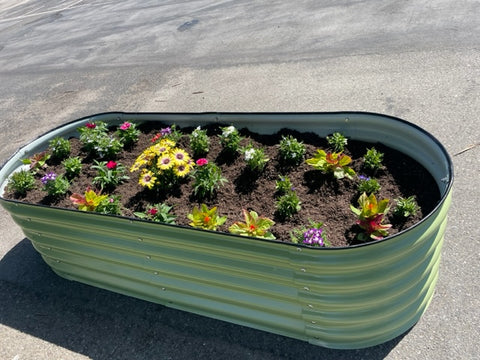Minimizing Land Degradation through Metal Garden Beds
Land degradation is a pressing global issue resulting from unsustainable agricultural practices, urbanization, and industrialization. As we strive to create a more sustainable future, it becomes imperative to explore innovative solutions that minimize the negative impact on our precious land. One such solution is the use of metal garden beds, which offer numerous benefits in reducing land degradation while promoting healthy plant growth. This article aims to delve into the advantages of metal garden beds and how they contribute to the conservation and preservation of our land.
Preservation of Soil Structure:
Traditional gardening methods often involve tilling the soil, which disrupts its natural structure, leading to erosion and nutrient loss. Metal garden beds, however, eliminate the need for tilling as they provide a contained growing space. By preventing the soil from being compacted or washed away, metal garden beds help maintain the integrity of the soil structure, thereby reducing land degradation.

Prevention of Soil Erosion:
Erosion poses a significant threat to fertile land, resulting in the loss of topsoil and essential nutrients. Metal garden beds act as effective barriers against erosion, especially on sloped terrains. The raised design of these beds helps to retain water and prevent it from washing away the topsoil. By minimizing erosion, metal garden beds ensure that the soil remains fertile and suitable for plant growth.
Contamination Control:
Traditional garden beds may come into contact with contaminants present in the soil, such as heavy metals, pesticides, or pollutants. These contaminants can be absorbed by plants, affecting their health and the overall ecological balance. Metal garden beds provide a protective layer between the soil and the plant roots, minimizing the risk of contamination. Furthermore, metal beds can be constructed using materials that are resistant to corrosion and leaching, ensuring the long-term integrity of the soil.
Efficient Water Management:
Water scarcity is a growing concern in many regions worldwide. Metal garden beds offer an advantage in water management, as they can be equipped with efficient irrigation systems. By incorporating drip irrigation or self-watering mechanisms, water usage can be optimized, reducing wastage and the strain on freshwater sources. The controlled irrigation in metal garden beds also helps prevent water runoff, conserving this precious resource.

Longevity and Durability:
Metal garden beds are known for their longevity and durability, especially when constructed using materials such as galvanized steel or aluminum. Unlike wooden beds that can deteriorate over time, metal beds can withstand various weather conditions, including heavy rains and extreme temperatures. Their durability ensures that the beds can be used for many years without needing frequent replacements, reducing the demand for new materials and the environmental impact associated with their production.
Conclusion:
The use of metal raised garden beds offers a sustainable solution to reduce land degradation and promote ecological preservation. By preserving soil structure, preventing erosion, controlling contamination, managing water efficiently, and providing long-lasting durability, these beds contribute to the conservation of our land. As we prioritize sustainability, embracing metal garden beds can help us create a greener and more resilient future while ensuring the continued availability of fertile soil for generations to come. Let us adopt these innovative solutions and work towards a harmonious relationship between cultivation and land preservation.
